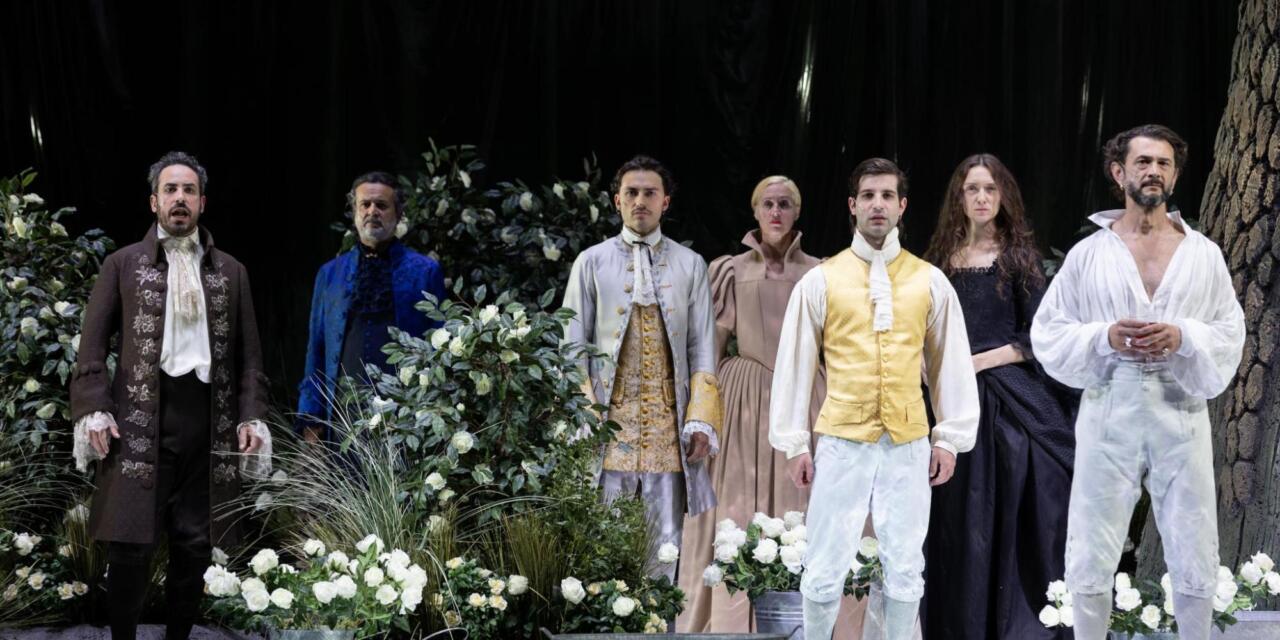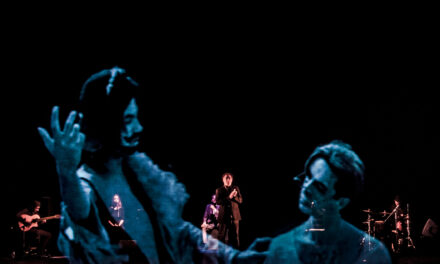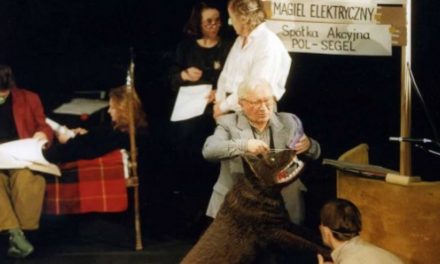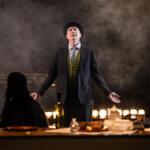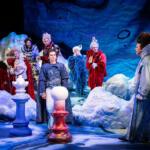Two major productions of Richard III are touring Italy in the present season, a sign perhaps that the dark side of the human psyche, which this notorious Shakespeare villain embodies, is foremost in our collective imagination, seeing the many wars and genocide in today’s world.
In late November I caught Antonio Latella and Federico Bellini’s adaptation of Richard III at Milan’s Piccolo Teatro. From the start, birdsong and a stunning, brightly lit garden of white roses fill the stage; standing central, a withered. hollow tree, devoid of branches. The white rose, symbol of the House of York, alludes to Richard’s side in the Wars of the Roses, while the tree provides Shakespeare’s arch-villain with a hidey-hole, where he can eavesdrop on the unfolding events, even when he isn’t part of the action. This secret place means he sees and hears everything and can control and manipulate everything and everyone at all times.
As the action kicks off, in the ‘privacy’ of the hollow tree, Richard can be seen pulling on some casual, white pants and a baggy shirt. Played by Vinicio Marchioni, this aspiring King has none of the physical deformity indicated in Shakespeare’s history play. The actor’s dark good looks hold one’s attention as he moves nimbly around the stage, plotting a string of horrific deeds, with a light-hearted callousness that bears few signs of remorse until the end. Richard’s attractive appearance, it must be said, creates a jarring short circuit with the self-description of his physical deformity (“I that am rudely stamped, and want love’s majesty\to strut before a wanton ambling nymph” Act one, scene I).
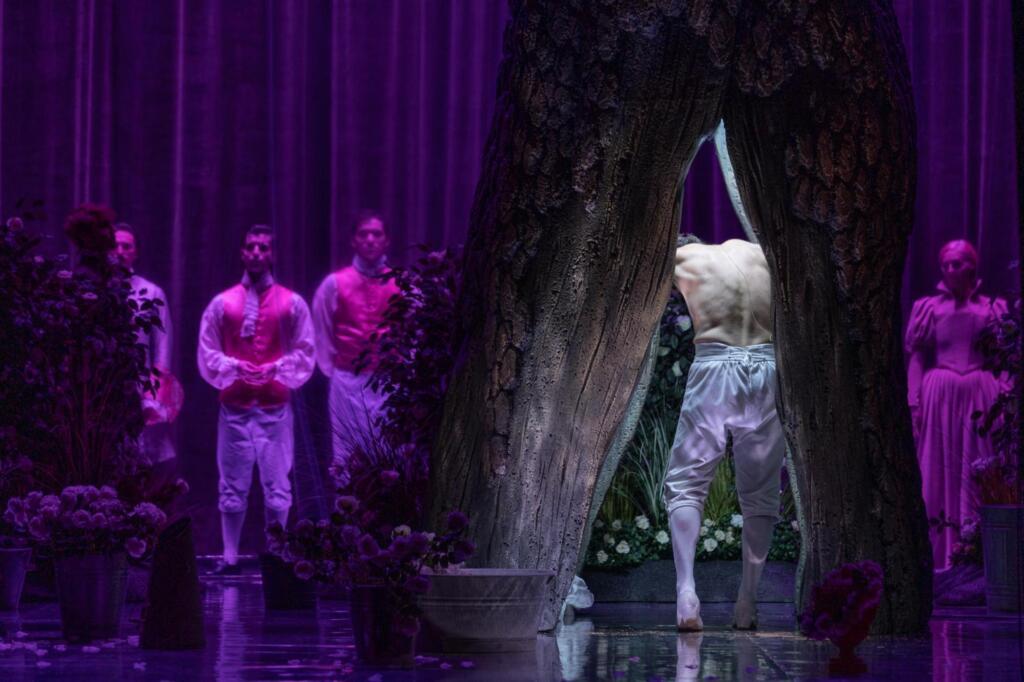
Vinicio Marchioni in Richard III, directed by Antonio Latella, Piccolo Teatro Milano. Photo credit: Gianluca Pantaleo.
The set and Richard’s appearance reflect director Antonio Latella’s concept of evil, which resides, “in beauty, not in disharmony. Evil is the garden of Eden.” (a program note) Far from more traditional interpretations of the protagonist, as a dark, disabled Machiavel, Latella’s conception comes close to recent interpretations of the King, such as Jonjo O’Neill’s Richard at the Royal Shakespeare Company during the World Shakespeare Festival in 2018, or the 2024 award-winning production at Belfast’s Lyric Theatre, starring an, at times, clownish Michael Patrick.
This Italian adaptation runs for just two hours and forty minutes, with an interval, which means cuts have been made, making me regret, for example, the loss of James Tyrell’s poignant monologue describing the murder of the two young Princes, which he instigated, in the Tower of London. Still the central conflict in the play remains intact and very powerful between Richard and his male supporters and antagonists, and especially the friction between him and Lady Anne (Giulia Mazzarino), the Duchess of York (Anna Coppola), Queen Elisabeth (Silvia Ajelli) and Queen Margaret (Candida Nieri). The fine performances of these female antagonists resonate loudly, exacerbating the conflict and highlighting their plucky resilience, while Federico Bellini’s new translation, which has a modern-day ring, admirably renders the many curses and expletives which the women rain down on Richard. Particularly Lady Anne invites our pity and empathy, as we watch her fall under the spell of this manipulative individual, who swiftly brings about her tragic demise, ordering her murdered so he can be free to make another marriage, with a beautiful young woman from the House of Lancaster. Nobody, not even his wife, can be allowed to get in the way of his plan to become King and unite the Houses of Lancaster and York. In the final scene the lighting grows dim and smoke fills the stage. Following the scene of the ghosts of the people whom Richard has disposed of, a lonely figure suddenly pulls out a pistol, shooting both Richard and the Earl of Richmond (dressed in red), a finale that turns Shakespeare’s ending on its head; during the battle of Bosworth, Richmond defeated Richard and became King Henry VII, the first Tudor King. This ending speaks of total destruction.
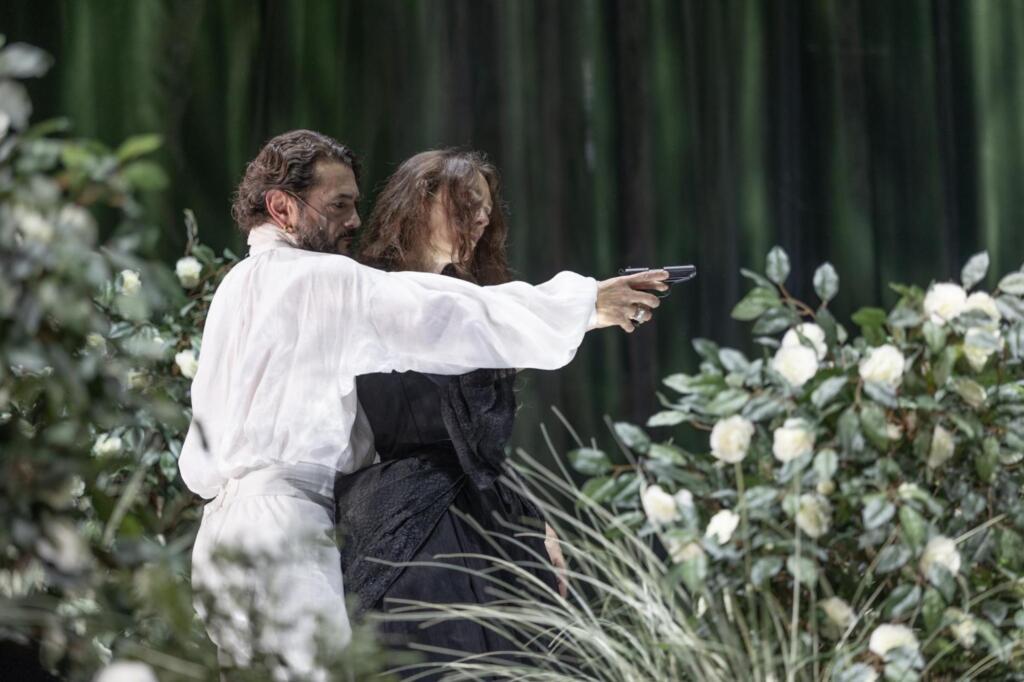
Vinicio Marchioni and Giulia Mazzarino in Richard III, directed by Antonio Latella, Piccolo Teatro Milano. Photo credit: Gianluca Pantaleo.
RICHARD III
By William Shakespeare
Translation Federico Bellini
Adaptation Antonio Latella e Federico Bellini
Director Antonio Latella
With Vinicio Marchioni (Richard III, referred to as Gloucester), Silvia Ajelli (Queen Elizabeth), Anna Coppola (Queen mother, Duchess of York), Flavio Capuzzo Dolcetta (keeper), Sebastian Luque Herrera (Duke of York, Richmond), Luca Ingravalle (Prince Edward), Giulia Mazzarino (Lady Anne), Candida Nieri (Queen Margaret), Stefano Patti (Buckingham), Annibale Pavone (Clarence – King Edward – Stanley), Andrea Sorrentino (Hastings, Mayor)
Dramaturg Linda Dalisi
Scenes Annelisa Zaccheria
Costumes Simona D’Amico
Music and sound Franco Visioli
Lighting design Simone De Angelis
Assistant Director and Movement Alessio Maria Romano
Volunteer Assitant Riccardo Rampazzo
Production Teatro Stabile dell’Umbria e LAC Lugano Arte e Cultura
This post was written by the author in their personal capacity.The opinions expressed in this article are the author’s own and do not reflect the view of The Theatre Times, their staff or collaborators.
This post was written by Margaret Rose.
The views expressed here belong to the author and do not necessarily reflect our views and opinions.

